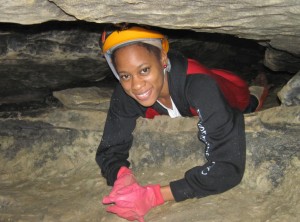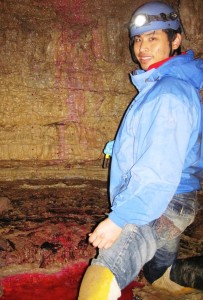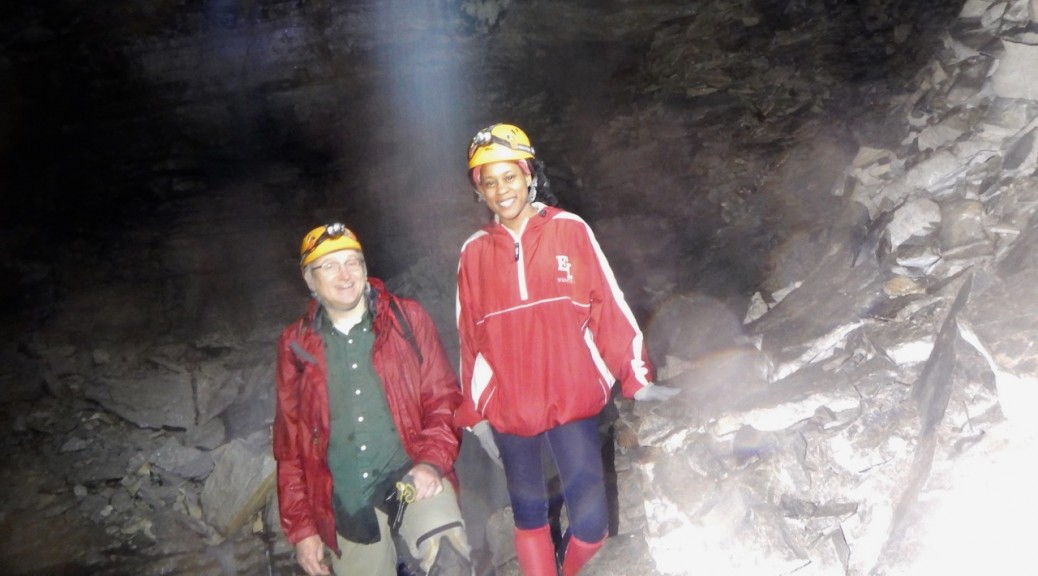
NASHVILLE, Tenn. (TSU News Service) – Tennessee State University student and faculty-led research findings are helping to keep the nation’s drinking water safe. According to reports from the recent National Cave and Karst Management Symposium in Cave City, Kentucky, two TSU graduate students and their professors presented findings on ways to improve water quality in the karst landscapes, a unique and fragile set of ecosystems that are dependent on clean stormwater recharge. Two-thirds of Tennessee has karst or karst-like landscape, including all of middle Tennessee. Their findings at Mammoth Cave have application to Nashville and the surrounding area.
Graduate students JeTara Brown and Hung Wai Ho, along with their professors in the Department of Agricultural and Environmental Sciences, partnered with federal agencies to investigate management practices that improve storm runoff from parking lots and spills in the Mammoth Cave National Park in south central Kentucky. The cave and karst systems serve as a habitat for unique ecosystems and sources of drinking water for much of the population.
According to Hung Wai, their research focused on the assessment and treatment of different pollutants in stormwater runoff in an urbanized area.

“Water is a vital part of the environment but anthropogenic activities have been causing impairment to the water quality, especially in the karst regions of Tennessee and Kentucky,” Hung Wai said. “Additionally, the National Park offers a dynamic and interactive environment for us to apply our academic knowledge in a real-world situation.”
The research was part of an agreement among TSU, the National Park Service, the U.S. Geological Survey, and the Western Kentucky University Mammoth Cave International Center for Science and Learning, to aid in understanding the transport of contaminants into the karst system.
“Over half of the U.S. population relies on groundwater as a source for water supply,” said Brown, a first-year graduate student. “Unfortunately, when it rains, contaminants can be transported into the groundwater through sinkholes and fractures that are unfiltered. The more we understand how karst systems work, the better we can find ways to protect them.”
Dr. Tom Byl is a research scientist with the U.S. Geological Survey. For the last 20 years he has partnered with TSU conducting environmental research and teaching occasional classes. Brown and Hung Wai are among the more than 150 students he has mentored.
“My students have conducted studies on a wide variety of topics, ranging from groundwater remediation to wetlands and cave systems,” Byl said. “Students bring new insight and energy to research projects. Involving TSU students in field studies and lab research helps them understand that they can have meaningful careers in earth and environmental sciences.”
On the quality of the research, Dr. Rick Toomey, director of the Mammoth Cave International Center for Science and Learning, said it is “incredibly” important to the science of caves.
“We have been incredibly impressed with the students Dr. Byl brings from TSU,” Toomey said. “They have been involved in helping to provide us with critical information on park management and finding interesting patterns in pure science such as water chemistry change. Their work has been very valuable and we hope it is also providing educational opportunities for the students.”
![IMG_1790[2] copy](https://tnstatenewsroom.com/wp-content/uploads/2015/11/IMG_17902-copy-300x203.jpg)
“JeTara and Hung Wai are great examples of our talented students at Tennessee State University,” said Dr. DéEtra Young, a faculty advisor. “As coordinator of the College of Agriculture Dean’s Scholars Program, I’m working diligently to increase research opportunities for our students. It is our goal to actively foster the academic and personal development of our students in preparation for the workforce or the many graduate opportunities available.”
“There are very few minority scientists in this very important field of cave and karst management. TSU’s Ag and Engineering colleges are trying to train and fill this gap,” said Dr. Chandra Reddy, dean of the College of Agriculture, Human and Natural Sciences. “Our faculty, Drs. De’Etra Young and Tom Byl, do an outstanding job in training students and the invitation they received to present at this important national meeting is a good indicator of that.”
Department of Media Relations
Tennessee State University
3500 John Merritt Boulevard
Nashville, Tennessee 37209
615.963.5331
About Tennessee State University
With more than 9,000 students, Tennessee State University is Nashville’s only public university, and is a comprehensive, urban, co-educational, land-grant university offering 38 undergraduate, 22 graduate and seven doctoral programs. TSU has earned a top 20 ranking for Historically Black Colleges and Universities according to U.S. News and World Report, and rated as one of the top universities in the country by Washington Monthly for social mobility, research and community service. Founded in 1912, Tennessee State University celebrated 100 years in Nashville during 2012. Visit the University online at tnstate.edu.
